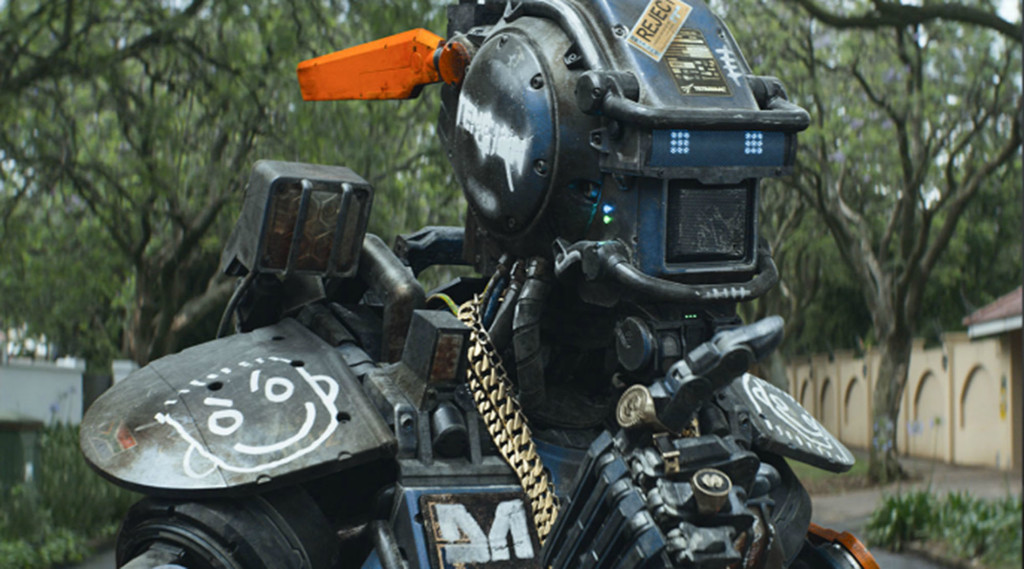Does the world really need another poorly conceived campy robot action flick? Director Neill Blomkamp obviously seems to think so.
Compared with his critically-acclaimed sci-fi thrillers “District 9” and “Elysium,” Blomkamp’s latest film “Chappie” falls flat. The complex narrative, hastily squeezed into a two hour film, falls into inconsistent breaks that prevent it from gathering any real steam. But the unique cast—including South African hip-hop duo Die Antwoord—manage to barely hold the film together.
The story centers on Deon Wilson (Dev Patel), an engineer for a security company that developed robots called “Scouts” to help the local police deal with out-of-control crime. Wilson wants to take his work further as he, rather randomly, writes the code for artificial intelligence.
The film’s backdrop of Johannesburg, South Africa would have made for a fluid dystopia on its own, but Blomkamp’s repeated use of this setting in his other films rendered it too familiar, almost stale.
Furthermore, the film noticeably avoids directly taking on issues of race, class and harsh policing—themes which helped make “District 9” so compelling. Instead, political unrest is only hinted at through unexplained rioters and people flashing guns.
Deon programs artificial intelligence into one of the Scouts and thus we have Chappie (Sharlto Copley), our robotic hero with human sentiment. But his accomplishment comes with spiteful competition.
Deon’s new invention leads to him being pursued by his work rival, a mullet-toting, gun wielding, religious zealot named Vince (Hugh Jackman). Vince had previously submitted a robot to design to the police, but it was passed over for Deon’s Scout model—and now Vince is seeking revenge.
To make matters even more complicated, Chappie and Deon are kidnapped by Die Antwoord crew Ninja and Yo-Landi, criminals trying to use Chappie to aide in a robbery. (Cast with their stage names, the duo also provided the movie soundtrack.)
But as Chappie is trained for a life of crime, he must confront the conflicting moral guidance he receives from Ninja, Yo-Landi and Deon.
Sound confusing? It is. The story arc is far too complex for a two-hour film.
Yo-landi and Ninja are first introduced in an action-packed drug deal gone wrong, but the context for their compromising situation is never revealed. Further, Deon’s character has virtually no background so we never know why he’s so passionate about artificial intelligence. And aside from Chappie, the rest of characters are static throughout.
Vince’s personality is so simplistic it’s almost satirical—despite Jackman’s rippling biceps, there’s no intriguing villain in this movie.
Deon and Vince’s boss is played by Sigorney Weaver, which seemed only relevant for Weaver’s deity-like reverence among classic sci-fi fans. I could literally count her lines on one hand.
To make things worse, Blomkamp’s script is a rollercoaster of awkwardly choppy lines. At one point, a flustered Deon calls Ninja “a shitty terrible person.” (That’s all you could think of?)
The film did have its endearing moments, such as Ninja teaching Chappie to be tough, Yo-Landi teaching him to believe in himself and Deon teaching him everything else.
Ninja and Yo-Landi’s funky aesthetic and brightly colored toys and knick-knacks juxtaposed with their run-down hideout, making for a bubblegum grittiness that fed the film’s constant swerve of emotions—their pink and yellow assault rifles matched my mini M&M’s.
In all, the contrast between nurturing to fighting and pink to rubble seemed to offer a symbolic parallel. And despite its narrative stumbling, “Chappie” had at least enough thematic material to keep me entertained.









